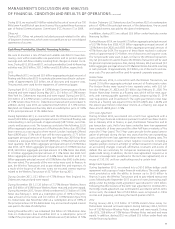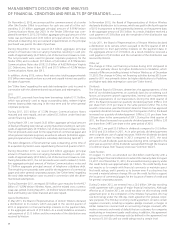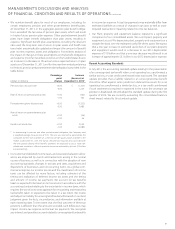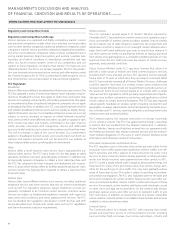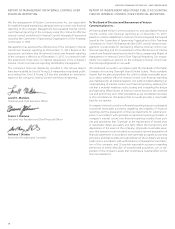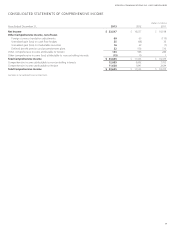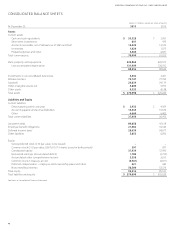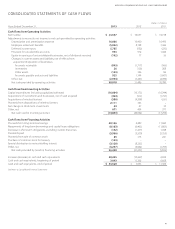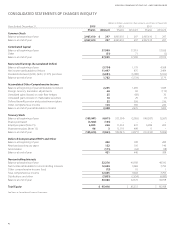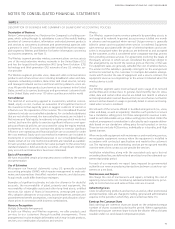Verizon Wireless 2013 Annual Report Download - page 36
Download and view the complete annual report
Please find page 36 of the 2013 Verizon Wireless annual report below. You can navigate through the pages in the report by either clicking on the pages listed below, or by using the keyword search tool below to find specific information within the annual report.
34
MANAGEMENT’S DISCUSSION AND ANALYSIS
OF FINANCIAL CONDITION AND RESULTS OF OPERATIONS continued
Regulatory and Competitive Trends
Regulatory and Competitive Landscape
Verizon operates in a regulated and highly competitive market. Current
and potential competitors include other voice and data service providers
such as other wireless companies, traditional telephone companies, cable
companies, Internet service providers, software and application providers,
andothernon-traditionalcompanies.Manyofthesecompanieshavea
strong market presence, brand recognition, and existing customer rela-
tionships, all of which contribute to intensifying competition and may
affect our future revenue growth. Some of our competitors also are
subjecttofewerregulatoryconstraintsthanVerizon.Formanyservices
oeredbyVerizon,theFCCisourprimaryregulator.TheFCChasjurisdic-
tion over interstate telecommunications services and other matters under
the Communications Act of 1934, as amended (Communications Act or
Act). Other Verizon services are subject to state and local regulation.
FCC Regulation
Broadband
Verizon oers many dierent broadband and Internet access services. The
FCChasadoptedaseriesofordersthatimposelesserregulatoryrequire-
ments on broadband services than apply to older voice and slower data
services.Forexamplecertainfacilityunbundlingrequirementsthatapply
to narrowband facilities of traditional telephone companies do not apply
tobroadbandfacilities.Inaddition,theFCCconcludedthatbothwireline
and wireless broadband Internet access services qualify as largely dereg-
ulated information services. Our broadband Internet access services are
subject tovarious attemptsto imposeso-called“networkneutrality”
rules, some of which were armed and others vacated on appeal in early
2014. Verizon has been and remains committed to the open Internet
which provides consumers with competitive choices and unblocked
access to lawful websites and content when, where, and how they want.
Thiswillnotchangeinlightofthecourt’sdecision.Ourcommitment
applies to broadband Internet access services provided over both our
wireline and wireless networks and can be found on our website at
http://responsibility.verizon.com/broadband-commitment.
Video
Verizon oers a multi-channel video service that is regulated like tra-
ditionalcableservice.TheFCChasabodyofrulesthatapplytocable
operators, and these rules also generally apply to Verizon. In addition, the
Act generally requires companies to obtain a local cable franchise, and
theFCChasadoptedrulesthatinterpretandimplementthisrequire-
ment. In areas where Verizon oers its facilities-based multichannel video
services, Verizon has typically been required to obtain a franchise from
local authorities.
Wireline Voice
Verizon oers many dierent wireline voice services, including traditional
telephone service and other services that rely on newer technologies
suchasVoIP. For regulatory purposes,legacytelephoneservices are
generallyconsideredtobe“commoncarrier”services.Commoncarrier
services are subject to heightened regulatory oversight with respect to
rates,termsandconditions,andotheraspectsoftheservices.TheFCC
has not decided the regulatory classication of VoIP but has said VoIP
service providers must comply with certain rules, such as 911 capabilities
and law enforcement assistance requirements.
Wireless Services
The FCC regulates several aspects of Verizon Wireless’ operations.
Generally,theFCChasjurisdictionovertheconstruction,operation,acqui-
sition, and transfer of wireless communications systems. And all wireless
services require use of radio frequency spectrum, the assignment and
distributionofwhichissubjecttoFCCoversight.VerizonWirelessantici-
pates that it will need additional spectrum to meet future demand. It
can meet spectrum needs by purchasing licenses or leasing spectrum
from others, or by participating in a competitive bidding process for new
spectrumfromtheFCC.Bothprocessesaresubjecttocertainreviews,
approvals, and potential conditions.
Today,VerizonWirelessholds FCCspectrum licensesthat allowit to
provide a wide range of mobile and fixed communications services,
includingbothvoiceanddataservices.FCCspectrumlicensestypically
have a term of 10 years, at which time they are subject to renewal. While
theFCChasroutinelyrenewedallofVerizonWireless’licenses,challenges
could be raised in the future. If a wireless license were revoked or not
renewed, Verizon Wireless would not be permitted to provide services on
the spectrum. Some of our licenses require us to comply with so-called
“openaccess”FCCregulations,whichgenerallyrequirelicenseesofpartic-
ular spectrum to allow customers to use devices and applications of their
choice,subjecttocertaintechnicallimitations.TheFCChasalsoimposed
certain specic mandates on wireless carriers including construction and
geographic coverage requirements, technical operating standards, provi-
sion of enhanced 911 services, roaming obligations, and requirements for
wireless tower and antenna facilities.
The Communications Act imposes restrictions on foreign ownership
ofU.S.wirelesssystems.TheFCChasapprovedtheforeignownership
in Verizon that has resulted from the Wireless Transaction. In addition,
Verizon Wireless, Verizon and Vodafone entered into an agreement with
the federal government that imposes national security and law enforce-
ment-related obligations on the ways in which Verizon Wireless stores
information and otherwise conducts its business.
Intercarrier Compensation and Network Access
TheFCCregulatessomeoftheratesthatcarrierspayeachotherforthe
exchange voice trac (particularly traditional wireline trac) over dif-
ferent networks and other aspects of interconnection for some voice
services. In many instances, Verizon makes payments to other providers,
and in turn Verizon receives some payments from other carriers. In 2011,
theFCCissuedabroadreformorderchanging,amongotherthings,the
framework for many of the per-minute rates that carriers charge each
other for the exchange of voice trac. The new rules gradually reduce
many of these rates to zero. This order is subject to pending reconsidera-
tionpetitionsandappeals.TheFCCalsoregulatessomeoftheratesand
termsandconditionsforcertainwireline“specialaccess”andotherser-
vices and network facilities. Verizon is both a seller and a buyer of these
services.Forexample,onthewirelinesideVerizonsellswholesalecircuits
to other voice and data service providers. On the wireless side, Verizon
purchases special access and other services to transport trac to and
from cell towers. In addition, as required by the Act, Verizon unbundles
certain wireline network elements and makes these facilities and services
available to other network providers.
Universal Service
TheCommunicationsActchargestheFCCwithensuringthatcertain
groups and areas have access to communications services, including
rural and other high-cost areas, low income subscribers, schools and
OTHER FACTORS THAT MAY AFFECT FUTURE RESULTS



